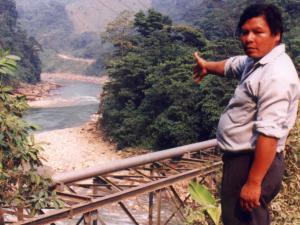Colombia: Families of Murdered Union Leaders Killed by the Army Lose U.S. Lawsuit Against Occidental Petroleum

Caño Limon pipeline. Photo: Rainforest Action Network. Used under Creative Commons license.
A U.S. court has refused to allow family members of three murdered Colombian union leaders the opportunity to sue Occidental Petroleum. The families claimed that the Los Angeles based company should be held responsible since it allegedly provided financial support for the military unit that killed the men.
Hector Alirio Martinez, Leonel Goyeneche Goyeneche, and Jorge Prieto Chamucero were shot and killed on the morning of August 5, 2004, outside Chamucero’s home in Caño Seco by members of the Colombian army’s 18th Brigade.
In its defense, the Colombian military claimed that the three men were members of the Ejército de Liberación Nacional (National Liberation Army), a guerrrila movement. In fact Alirio was a former president of the Departmental Association of Peasant Consumers (ADUC), Goyeneche was treasurer of the CUT Workers Unitary Central and Prieto was president of the National Association of Hospital and Clinic Workers (ANTHOC) in Arauca.
Eighteen family members of the three victims brought a lawsuit against Occidental in November 2011 with the help of Terrence Collingsworth, a Washington DC-based lawyer. They stated that Occidental was making regular payments to the Colombian National Army (CNA) to guard a 170 kilometer pipeline that runs from the company’s Caño Limon oilfield to the port of Coveñas.
“Occidental directly provided the CNA with (or provided the CNA with the funds for) the helicopter used to move the decedents’ bodies, the communications equipment used on the day of the attack, and other material support used by the 18th Brigade on the day of the attack,” the families wrote in their lawsuit.
“Occidental, through its participation in the 2004 Security Agreement, especially through monetary support, aid in kind, and its role on the coordination committee, supported the operations of the 18th Brigade and thus contributed to the decedents’ deaths,” the families added.
Howeve, the San Francisco-based judges ruled on December 15, that U.S. courts did not have the power to judge the matter.
“The panel concluded that plaintiffs’ claims were inextricably bound to the inherently political question of the propriety of the United States’ decision to provide $99 million worth of training to the 18th Brigade at the same time and for the same purpose as Occidental allegedly providing $6.3 million,” wrote Judges Alex Kozinski, Stephen Trott, and Consuelo Callahan in a unanimous court opinion. “We cannot adjudicate plaintiffs’ claims without inquiring into or passing judgment on those political decisions. Any verdict or judgment in favor of plaintiffs would necessarily conflict with and denounce our government’s official actions.”
Trott added a separate note to say that he personally believed that the Colombian army was doing a good job, based on annual reports provided to the U.S. Congress by the U.S. government. “These State Department human rights certifications stand in stark contrast to Plaintiffs’ complaint and theory of liability.”
The three judges also noted that in 2013 the U.S. Supreme Court had ruled that U.S. courts did not have jurisdiction over crimes committed by corporations in other countries when they dismissed a lawsuit against Shell in Nigeria that had been brought under the Alien Tort Statute (ATS).
The ruling is yet another in a series of setbacks for Colombian union leaders seeking justice through U.S. courts for financial support provided by U.S. companies and the U.S. government to the Colombian army and right wing paramilitary groups who have conducted brutal attacks on local activists over the last two decades under the guise of fighting the guerrillas.
In August 2013, U.S. District Judge David Proctor dismissed a case brought by Colombian families against Drummond Coal, a company from Alabama, for allegedly supporting the Autodefensas Unidas de Colombia, a right wing paramiltary group that has targeted and killed union activists. That case, which was also brought by Collingsworth, in now under appeal, after several former AUC members testified under oath as part of Colombia’s Peace and Justice Program about their role.
Meanwhile, Drummond has also counter-sued Collingsworth in an effort to stop him.

